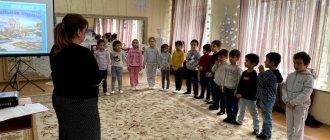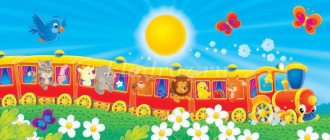MAGAZINE Preschooler.RF
Educational project “What is mail?”Developed by: Morozova I.M., teacher Municipal budgetary preschool educational institution combined type kindergarten No. 24 of the village of Sovetsky municipal formation Yeisk district
Type of project: social, educational, informational and creative
Project duration: medium term.
Project implementation period: from 01/09/2019 to 03/22/2022.
Project participants: teacher, children, parents.
Children's age: 5-6 years.
Relevance of the project:
Modern children are little familiar with the work of the post office and postal employees, however, . ” Every profession is necessary for our society. The job of a postman is still in demand. Postal workers make a significant contribution to improving the life and development of the country. Currently, such a profession as a postman is beginning to be forgotten. Internet resources and mobile communications are used more often. And children do not know what a letter written on paper, in their own hand and sent by mail is, since adults mainly use more modern technology for transmitting information and messages. Receiving periodical literature via mail replaces purchasing it in stores or specialized kiosks. We turn to full postal and postman services less and less often. Children practically do not know what the work of a postman is. In this regard, the idea arose to create a project on this topic in order to develop children’s initial knowledge about children’s mail and the profession of a postman.
The goal of the project: to develop children’s initial knowledge about mail and the profession of a postman.
Project objectives:
- To form in children an idea of the work of postal workers and the importance of their work.
- Enrich your vocabulary with words: stamp, letter, postcard, parcel, mailbox, etc.
- Show the stages of postal development: the appearance of mailboxes, the invention of envelopes, wax seals, stamps.
- Organize reading books about the work of a postman
- Looking at illustrations on the topic: “Mail”
- To promote the development of basic educational skills: perform actions according to a model, demonstration.
- Develop practical skills in visual arts (creating drawings on the theme of the project, “This is him, this is him, the Leningrad postman” ).
- Creative work of children for parents: “Draw a picture for a letter on the topic: “Who do I want to be” ,” excursion to the post office.
- Arouse children's interest in the role-playing game "Mail"
- Purchase ready-made attributes for the game - parcel boxes, postcards, postal transport
- Organize participation in the social action “Parcel to a Soldier” with the involvement of members of the child’s family, create in parents and children a desire to take part in joint actions.
- Foster respect for the work of adults and for the Motherland.
Expected results of the project:
- Children 5-6 years old will receive initial knowledge about the work of postal workers and the importance of their work.
- Expansion and activation of the dictionary on the topic “Mail” .
- Replenishment of the development environment in the group on the topic “Mail” .
- Participation in the “Parcel to a Soldier” as part of the month of military-patriotic education.
Project participants:
Children, parents, teachers.
Project implementation stages:
Stage I - Preparatory and informational
- drawing up a work plan
- collection and design of visual material
Stage II – Main
- conducting educational conversations
- conducting excursions, meetings
- organization and implementation of the social event “Parcel to a Soldier”
- joint artistic and creative activities of teachers and students
- involving parents in events
Stage III – Final
- summing up the work
Demonstration material:
Illustrations on the theme “Mail” ;
pictures and photographs of mail in the past and present;
Post office in Sovetsky village;
List of used literature:
Gerbova V.V. “Classes on speech development in the senior group of kindergarten” , Moscow 2022.
Dybina O.V. “Acquaintance with the subject and social environment” Senior group, Moscow 2014
Zatulina G.Ya. “Speech development of preschoolers” senior group. Moscow, 2015
Zelenova N.G., L.E. Osipova “We live in Russia” senior group. Moscow 2007
Komarova T.S. “Art activities in kindergarten. Senior group
Moscow 2022
Koldina D.N. “Applique with children 5-6 years old” , Moscow 2015
Koldina D.N. “Drawing with children 5-6 years old” Moscow, 2015
Koldina D.N. “Modeling with children 5-6 years old” Moscow, 2015
Kutsakova L.V. “Classes on designing from building materials in the senior group of kindergarten . Moscow, 2010
Kutsakova L.V. Artistic creativity and design 5-6 years. Moscow
2017
Lykova I.A. Visual activities in kindergarten. Senior group
Moscow, 2012
Pecherskaya A.N. Reader for kindergarten. Senior group. Federal State Educational Standard DO. Moscow, 2018
Ushakova O.S. “Speech development of children 5-7 years old” Moscow, 2022.
Report
about the implementation of the project “What is mail?”
teacher Morozova Irina Mikhailovna
In the period from 01/09/2022 to 03/22/2022. in the senior compensatory group, a project on social and communicative development “What is mail?” ", developed by teacher Morozova Irina Mikhailovna. The participants of the project were children of the senior group of compensatory orientation, parents, and teachers.
The goal of the project: to develop children’s initial knowledge about mail and the profession of a postman.
As part of the implemented project, children developed initial knowledge about mail and the profession of a postman, skills in gaming activities, enriched practical and gaming experience, cognitive and research activities contributed to the formation of a holistic picture of the world.
During the implementation of the project, many activities were held: conversations, examination of envelopes, postcards, children's newspapers and magazines, mailboxes, practical activities, reading children's literature, didactic games and exercises: “Send a parcel” , “What is missing?” , “Get a letter” , role-playing games: “Mail” , “To whom is the letter” , replenishment of the subject development environment on the topic “Mail” , creation of a corner for role-playing games: “Mail” .
The children visited the post office in Sovetsky, listened to the postman's fascinating story about his work, and looked at the necessary equipment for receiving and sending letters, newspapers, and parcels. The children themselves sent letters to their parents and received a parcel from Postman Pechkin. Our pupils took an active part in the social action “Parcel to a Soldier” with the involvement of members of the child’s family. The children collected everything necessary for the serviceman in a parcel. Each child wanted to personally participate in assembling gifts for a young soldier serving in the ranks of the Russian Army.
The children and I took a group photo, wrote a letter and put everything together in a package for the defender. The collected parcel was sent to a soldier who had left for service in our village. Such events are an excellent opportunity to instill a sense of pride in one’s people, the army, and the Motherland.
As part of the project, an exhibition of drawings was organized, where children’s works were presented on the theme “It’s him, it’s him, the Leningrad postman .
Parents of the students were active participants in the project and, together with the children, participated in the development of the collage “Russian Post” and attributes for the role-playing game “Mail” .
The final stage of the project was the creation of a mailbox for communication in the parent's corner.
The experience of working on the project was presented to colleagues on March 26, 2019 at the pedagogical council.
Teacher I.M. Morozova
| Next > |
Lesson on speech development in the middle group “Profession postman”
Lesson summary for the middle group Profession postman
Cognitive development:
Continue to introduce the profession of a postman, expand ideas about the necessity and benefits of his work, introduce people working at the post office to the attributes of their profession.
develop visual and auditory attention when the teacher talks about mail. Cultivate respect for the work of a postman.
Speech development:
Expand the vocabulary of words on the topic “Mail”, develop memory and thinking, continue to teach to actively participate in conversation, expand and concretize ideas about the work of the post office and postman, improve the grammatical structure of speech (formation of relative adjectives); activate children's speech activity.
Physical development:
Develop motor activity
,
improve coordination of movements.
Preliminary work:
reading the story by V.G. Suteev “Christmas tree” and the poem by S.Ya Marshak “Mail”;
making New Year's cards for children of the junior group "Teremok" didactic game "Professions". Vocabulary work:
postman, stamp, internet, telegraph, telegram, airmail.
Progress of the excursion.
- Surprise moment:
The teacher asks a riddle. He brought us a telegram: “I’m coming, wait, mom.” Brought a pension to my grandfather, Even though he’s not Santa Claus at all. He's been on his feet since dawn, Who is he? (Postman.)
The teacher invites the children to visit the postmen at the post office. So, it’s decided, you and I will go to the post office and send our greeting cards.
- Organizing time
The teacher invites the children to go visit the post office. So, it’s decided, you and I will go to the post office and send our greeting cards.
Guys, guess the riddle.
“I hang on the wall in blue and a lot of greetings are stored in me.” (Mailbox.)
- Reading a poem
Now I’ll put our postcards in the box. Letters to the mailbox are like birds, Flocking to hit the road. Some go to Moscow, and some go abroad, Just the address, my friend, don’t forget. And our postcards will go to the “Smile” kindergarten to the “Teremok” junior group. Let's go to the post office and meet the postal workers.
Simulation of walking to the post office. The children approach the table; two children dressed as postal workers sit at the table and there is a mailbox nearby.
This is ours, the Solnyshko post office. Wonderful people work here: the head of this communications office is Ekaterina and the postman is Rimma.
4. Conversation “What is mail for?”
- What do you think mail is for? (Children's answers) (People need mail so that they can contact other people, congratulate relatives and friends on the holiday with a postcard or telegram, tell in a letter about themselves, about their family, about interesting events. You can also send a parcel, subscribe to interesting magazines , newspapers. And before the New Year holiday, postmen have a lot of work. They are Santa Claus's assistants and they need to have time to deliver the holiday mail. During the holidays there is more work at the post office... Trains are rushing, And planes are flying. Ships are sailing, And cars are running - Postal cargo Po they bring it to the world. During the holidays there is more attention at the post office... Congratulations are in a hurry, wishes are in a hurry. And without delay, Reliably and accurately, they must be delivered to the post office address.
5. Didactic game “Who needs what for work?”
6. Exchange of thoughts “How to send a parcel correctly”
The teacher invites the children to choose postcards to send by mail to their loved ones and friends. (You need to write to someone.) -You need to write the address: city or village, street, house number, name of the person you are writing to.
7. Solving problem situations
My grandmother had apples and she would like to send them to me for New Year. Apples won’t fit in a letter, what should I do (It needs to be sent in a parcel.) Large cargo is sent in a parcel. A parcel is a small or large box in which they put what they want to send.
—
How do they transport mail? (By car, by train, by plane.) Educator: Well done! How to call a car, train, plane in one word? (This is transport.) Guys, what are the computers for here? Children: Play. Educator: Maybe someone is playing. You can also write on the Internet - this is a new modern connection. Guys, let's go to another room. Here Rimma signs newspapers and magazines - whoever to take them to - and puts them in her large bag. Look how heavy it is. What color is the postman's bag? Blue. Educator: Correct. Both the postal machine and the postman's uniform are also blue. The difficult but very necessary job of a postman. In cold weather, in hot weather, and in rain, all newspapers, magazines and letters must be distributed. Honor and glory to the postmen, Tired, dusty Honor and glory to the postmen With a thick bag on their belt! Educator: Let's say goodbye to the wonderful postal workers and say “thank you” to them for their work. Children: Thank you! Goodbye!
7. Summary of the lesson
Plan - summary of the plot-role-playing game "Mail"
Driver -
delivers new newspapers, magazines, postcards to the post office; delivers parcels and parcels; picks up parcels and parcels and takes them to the railway.
Sorters –
sort received correspondence (newspapers, magazines, letters)
Developing subject-spatial environment meets the requirements
Federal State Educational Standard for Educational Education is content-rich, transformable,
multifunctional, variable, accessible and safe.
The subject-development environment should stimulate children's activity, namely, together with the children, decorate the play space with the necessary objects, attributes, and things.
1.Workplace for the post office manager - desk, computer, telephone.
2. Operator’s workplace for receiving parcels, parcels, registered
letters - table, chair, cash register, computer, telephone, notices,
magazine with subscriptions, parcels, letters, lottery tickets, parcels, scales.
3. Workplace of the customer service operator - computer, telephone
4. Postman bag with magazines, newspapers, letters, notices
receiving the parcel.
5. For post office clients - 2 tables, chairs, passport, money, bank card.
Progress of the game.
Creating a problematic situation. Children find a package in the group.
- This is a package, it got lost. What should we do with you?
- Someone needs her, they are waiting for her. The address is written on the parcel (read).
- And how can we send it to the recipient?
— We can take the parcel to the post office, and they will send it to the address there.
- Which of you was at the post office?
- Let's remember what we saw there.
— Guys, tell me, why do people come to the post office?
- Guys, let's think about it, when we come to the post office to send a letter, what should we do first?
- That's right guys! To prevent the letter from getting lost, you must indicate the correct address and stick the appropriate stamp. After all, even if we live in the same city, we still all have different streets and houses.
-What should you do next with the letter?
— What if we need to send a parcel?
— You must first fill out a notice in which, just like on the envelope, you must indicate the address of the person to whom we are sending the parcel and your home address. Then you need to contact a postal worker who will weigh the parcel and put it in a box or wrap it in paper so that the parcel arrives safe and sound. And he will definitely put the post office stamp on it.
— Working at the post office is very interesting, but very responsible. Guys, postal workers need to carefully ensure that all letters, parcels and newspapers reach the right address.
Do you know how to subscribe to a magazine or find out when your order arrives in the mail without leaving your home?






